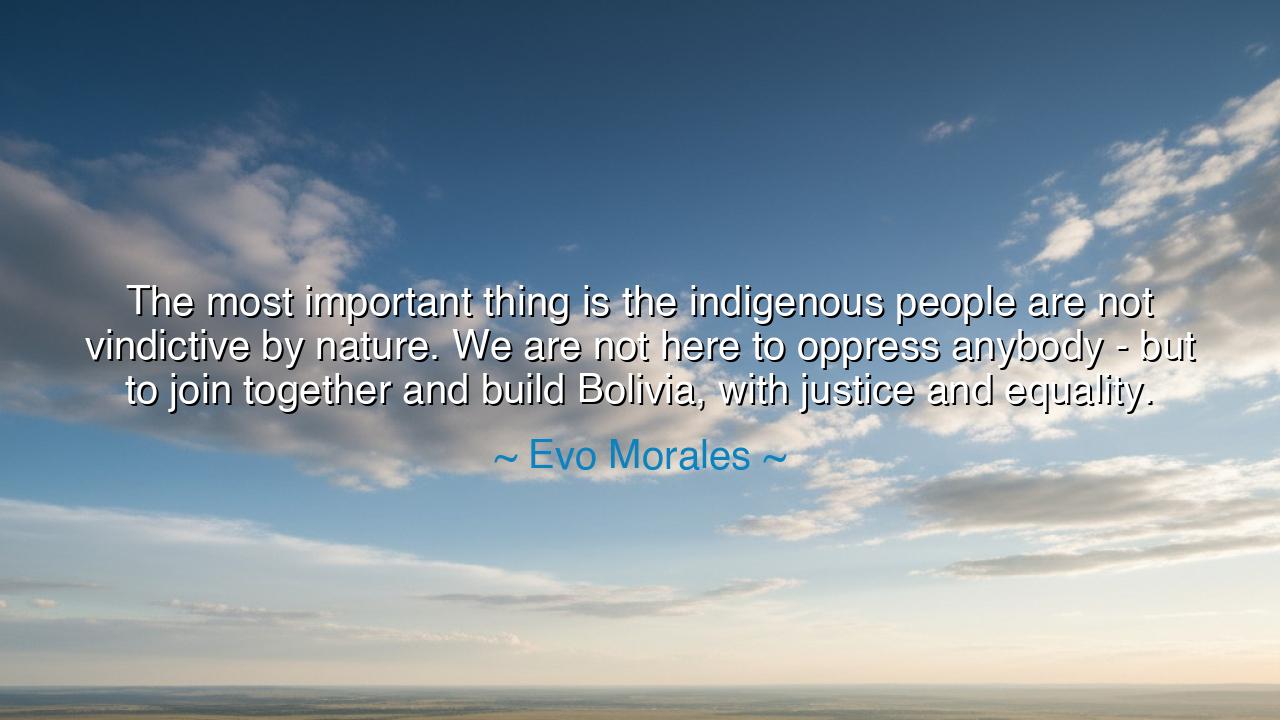
The most important thing is the indigenous people are not
The most important thing is the indigenous people are not vindictive by nature. We are not here to oppress anybody - but to join together and build Bolivia, with justice and equality.






“The most important thing is the indigenous people are not vindictive by nature. We are not here to oppress anybody—but to join together and build Bolivia, with justice and equality.” Thus spoke Evo Morales, the son of the Andes, the voice of the forgotten earth, and the first indigenous president of Bolivia. His words carry the weight of centuries—of pain endured and dignity reclaimed. They are not the cry of rebellion, but the song of reconciliation. In them, we hear the heartbeat of a people who, after generations of being silenced, rise not in vengeance, but in hope. Morales speaks as one who knows that justice without mercy becomes tyranny, and that the true victory of the oppressed lies not in domination, but in the healing of the nation’s soul.
For in the mountains of Bolivia, and across all lands where the first peoples once walked in harmony with the earth, the history of the indigenous is written in both suffering and strength. Conquered, enslaved, and stripped of their birthright, they yet preserved the sacred flame of their identity. And when that flame rekindled into leadership, Morales refused to let it consume in bitterness. “We are not vindictive,” he said—not because there was no cause for anger, but because anger, though just, could not build what had been broken. His vision was of a nation reborn, where equality would no longer be a promise deferred, but a reality lived; where those once scorned would now stand shoulder to shoulder with all others, not as rulers over, but as builders with.
In his words, Morales evokes the eternal wisdom of the ancients: that forgiveness is the highest strength. The heart that forgives does not forget its history; it transcends it. The indigenous of Bolivia, whose ancestors endured centuries of exploitation under empires and oligarchies, had every reason to seek retribution. Yet Morales taught them another way—the way of unity. He knew that to heal a wounded nation, one must not strike again at old enemies, but call even the adversary to labor in the same field of renewal. Thus, he stood not as a conqueror, but as a bridge, joining the two Bolivias—the one of the mountains and the one of the cities—into a single people.
Consider the tale of Nelson Mandela, who, after decades of imprisonment under apartheid, emerged not with hatred, but with grace. When South Africa expected revenge, Mandela gave reconciliation. “I have walked that long road to freedom,” he said, “and if I did not leave my bitterness behind, I would still be in prison.” Morales’ spirit echoes this same truth. To be vindictive is to remain chained to the past; to forgive is to open the path to the future. Both men understood that justice is not fulfilled through humiliation of the oppressor, but through the restoration of the human bond between all peoples.
Morales also reminds us that equality cannot be achieved through division. His dream was not of one class rising to replace another, nor of one race taking the throne from another. It was a dream of balance, harmony, and shared labor—the vision of the Ayllu, the Andean principle of community and reciprocity, where all contribute, and all receive. To “build Bolivia,” as he said, is not the task of one people alone, but the calling of all who dwell upon its sacred soil. For the nation, like the mountain, endures only when its roots are bound together.
The power of Morales’ words lies also in their humility. He does not claim victory; he calls for unity. He does not exalt his own people above others, but invites all to share in the work of justice. This humility is the mark of a true leader—the recognition that power serves only when it uplifts, that greatness is found not in ruling, but in reconciling. To build with equality means to see the divine spark in every face, to understand that no tribe, no class, no color, has a monopoly on dignity.
So, my listener, let this truth be written in your heart: do not answer oppression with oppression, nor hatred with hatred. If wrong has been done to you, rise above it—not in silence, but in wisdom. Let your fight for justice be noble, not bitter; let your power heal, not wound. Seek not to triumph over others, but to triumph with them. For the world, like Bolivia, can only be built when all its children labor side by side.
And when you speak of equality, let it not be a slogan, but a way of life. Stand for those who are unseen. Lift up those who have been bowed low. Remember Morales’ words—that the greatness of a people is not measured by their revenge, but by their compassion. To forgive is not weakness; it is divine strength. To build with love is to conquer eternity. And so, may we all labor as the indigenous once did—close to the earth, close to one another, and guided always by the spirit of justice and equality, which alone can make the human family whole.






AAdministratorAdministrator
Welcome, honored guests. Please leave a comment, we will respond soon